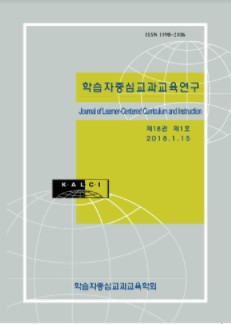
2015년 개정 도덕과 교육과정에서 ‘성찰’의 문제
아리스토텔레스를 중심으로
- 학습자중심교과교육학회
- 학습자중심교과교육연구
- 제18권 23호
- 등재여부 : KCI등재
- 2018.12
- 1291 - 1311 (21 pages)
2015 개정 도덕과 교육과정의 핵심 화두는 ‘도덕함’이며, 도덕함에서는 성찰의 중요성에 방점을 찍고 있다. 우리는 본 논문을 통해 성찰의 의미를 새로이 조명해보고 있으며, 그 과정에서 주로 아리스토텔레스의 논의에 빚지고 있다. 본 논문에서는 먼 저 칸트의 철학함을 통해서 도덕함의 의미를 유추해 본다. 수순으로 성찰이 도덕함의 핵심 요소로 자리매김할 수 있을지 궁구(窮究)해 보고 있으며, 아리스토텔레스가 논의하고 있는 ‘관조’를 통해 그 가능성을 발견하고 있다. 우리가 본 논문을 통해 전 언(傳言)하고자 하는 바는 성찰의 기저에 관조의 함의가 포함되어야 한다는 것이며, 그 근거로 자발성, 지속성, 즐거움 등의 속성을 논하고 있는 아리스토텔레스의 담론을 借用(借用)한다.
The 2015 revised national curriculum of moral studies took as its core topic ‘doing moral’ where reflection plays a pivotal role. The purpose of this study was to get new insights into the meaning of reflection with a major reference to Aristoteles’ discussions. For this purpose, the study tried to infer what doing moral means from Kant’s doing philosophy. And then, this study considered whether it would be possible for reflection to be established as a positive activity with continuity, spontaneity and delight. Kant asserts that doing philosophy is something you discipline yourself to practice through criticizing or even rejecting what you learned. In the 2015 revised national curriculum of moral studies, it is assumed that doing moral can be defined as apparent only when it involves both reflection and practice. If the assumption is true, the essential requirement for doing moral is your spontaneity that you nurture on your own, as suggested by Kant. And there’s another requirement that Aristoteles defines as a ‘quality which you don’t get bored of’. It is continuity. According to Aristoteles, both continuity and spontaneity are ‘qualities that are not boring’ and activities with those qualities are no doubt delightful. Catching up that such activity lies in contemplation that was Aristoteles’ ultimate pursuit, this study suggested that things underlying reflection should include the implications of contemplation.
Ⅰ. 머리말: 윤리교육의 당위
Ⅱ. 도덕과 교육과정: 도덕함의 의미해명
Ⅲ. 아리스토텔레스: 관조의 윤리학적 해명
Ⅴ. 맺음말: 관조의 즐거움과 교육적 함의